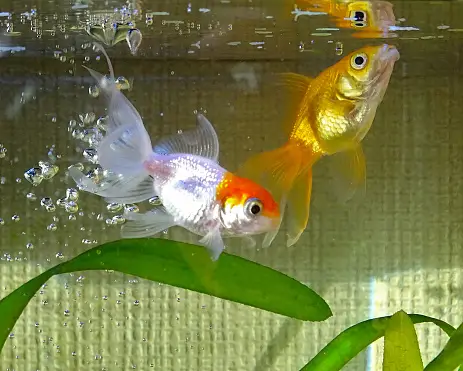Have you ever wondered whether your pet goldfish gets enough sleep at night? While they do not nap like humans, goldfish do have recognizable sleep patterns. Familiarizing yourself with the way that goldfish sleep can help you set up an environment that is most comfortable for them and will guarantee their well-being.
The comprehensive guide will consider an exploration: do goldfish sleep? You are about to be told how to identify a fish in its slumber so that you can make it feel happy. Okey-dokey, let’s start on this tour and try to throw some light on sleep among fishes!
Do goldfish sleep?
Yes, goldfish sleep! Yet, these animals do not have a similar sleeping pattern as people or other mammals. Unlike us, such creatures have no eyelids to close when they want to relax; instead, their bodies go into a state of reduced activity and metabolism commonly referred to as ‘sleep.’
Within this period, goldfish may appear motionless or move slightly. The speed of respiration slows down, and the reaction threshold goes down, too; thus, fish become less attentive to external stimuli. This kind of sleeping-like process saves energy, hence restoring it during the next active phase.
Understanding goldfish sleep behavior
To fully comprehend goldfish sleep, it’s essential to recognize their unique behaviors during this time. Here are some common observations:
- When asleep, many times gold fishes lie on their sides in the tank or remain at the bottom of the tank. This helps them save energy and maintain proper buoyancy.
- Limited Mobility: There might be small flicks coming from their tails but overall movement becomes much lesser than when they were awake.
- Extended Breathing Span: A sleeping gill moves slower than usual, signaling a reduced breathing rate in your golden carp’s mouth.
- Reduced Alertness: If knocking softly on the tank walls or moving around it doesn’t get any response from the fish, then it’s likely sleeping.
It should be remembered that goldfish sleep differently from humans. They do not have similar sleep stages as REM (Rapid Eye Movement) and deep sleep. Instead, they experience more of a resting and relaxing state during their slumber hours.
Signs of goldfish sleeping
It can be difficult to tell if a goldfish is asleep, particularly for new fish keepers. The following are some signs that indicate your goldfish is taking some Zs:
- Stationary Position: When the fish decides to stay still, lying with its weight on the bottom or sides of the aquarium, it means it is perhaps having a nap.
- Reduced Gill Activity: Look at how your pet breathes in water. If you see gill movements becoming slower than average or less prominent, this may mean that they feel sleepy.
- Lack of Response: Just knock softly on the glass or sprinkle a pinch of food in there. If you find that your fish remains unresponsive or sluggish, then perhaps it’s snoring.
- Shut Mouth: When awake, most times goldfish breathe while opening their mouths slightly; however, during their slumber hours the mouth can’t close or look less opened.
It should be noted that certain fish show these signs better than others, and depending upon factors like age, habitat and individual liking, their sleeping patterns may differ.
Factors that affect goldfish sleep
Many things can affect how much your goldfish sleeps and the quality of their sleep. Here are some factors you should know about in order to create a favorable environment for your finned pets:
- Light Cycles: Goldfish are sensitive to light and often tend to sleep more during periods of darkness or when in dimly lit areas. This means that in order to regulate their sleep, there has to be a consistent pattern of daylight/darkness.
- Tank Environment: Goldfish’s sleep is influenced by wahttps://lynndailyitem.com/ter quality, tank size and temperature. Rest can be disrupted by poor water conditions, overcrowding or fluctuating temperatures.
- Stress Levels: Various sources such as loud noises, vibrations or aggressive tank mates may stress goldfishes out. These high-stress levels can disturb their sleep, making it hard for them to get sound sleep.
- Age and Health: Young goldfish may have a higher tendency to sleep more than older ones, while illness or disease may also affect their sleeping patterns.
By addressing these factors, you can create a more conducive environment for your goldfish to rest and recharge.
Creating the ideal sleeping environment for goldfish
To promote healthy sleep habits for your goldfish, consider the following tips:
- Establish a Day/Night Cycle: To help them get better rest, make sure they are exposed to bright light during the daytime only and dark or no light at all at night, which imitates natural lighting cycles.
- Maintain Optimal Water Conditions: Ensure your tank has a proper filtration system, a regular water change schedule as well as appropriate water parameters (temperature, pH, ammonia, nitrite & nitrate levels). Bad water conditions are dangerous. It’s stressful and, therefore, causes problems with falling asleep, among other issues that it might cause them.
- Provide Hiding Spots: For security purposes, consider introducing plants, caves or other accessories into the aquarium which offer hiding places for the fish during resting times.
- Reduce Noise and Vibrations: The goldfish are easily startled by loud noises or vibrations, which can disrupt their sleep. Thus, you may need to move the tank away from noise or vibration sources or use aquarium mats, which will absorb these vibrations.
- Monitor Tank Mates: Aggressive tank mates can cause stress and interrupt the sleep patterns of your goldfish. Keep in mind that your goldfish should have enough space and compatible mates when selecting them.
By creating a peaceful and stress-free environment, you’ll encourage your goldfish to rest comfortably and maintain their overall well-being.
Importance of a well-maintained Goldfish Tank
A well-maintained goldfish tank is crucial for ensuring your finned friends get the rest they need. Poor water quality, overcrowding, and other environmental stressors can significantly impact your goldfish’s sleep patterns and overall health.
Here are some key reasons why a properly maintained tank is essential for goldfish sleep:
- Water Quality: Frequent water changes, effective filtration systems and monitoring water parameters are very important for maintaining a healthy environment, as poor water quality leads to increased levels of stress, which ultimately leads to poor sleep, among other health issues faced by these aquatic animals.
- Adequate Space: Overcrowding causes stress, aggression and competition for resources. All these interfere with comfortability while resting. Make sure, therefore, that your aquarium holds exactly the number of Gold Fish it was designed for, nothing more nor less.
- Suitable Decor: You could also create serene surroundings by having hiding places here and there; this would make them feel secure enough, hence giving them an opportunity to enjoy their nap peacefully. Therefore, strategic positioning of plants, caves or any other ornamental items provides a calm atmosphere where goldfish can relax during their rest periods.
- Suitable tank mates: Having aggressive or territorial tank mates can be very stressful for your goldfish and will disturb their sleep. Make sure you research well and pick compatible species that won’t bully or harass your goldfish.
- Consistent schedule: Keeping the same time for feeding, light routine, and water changes can establish a regular environment in which a better pattern of sleep may occur.
By prioritizing a well-maintained goldfish tank, you’ll not only ensure your finned friends get the rest they need but also contribute to their overall health and longevity.
Conclusion
Goldfish may not snore or curl up in a cozy bed, but they do go through periods of reduced activity and rest, which are essential for their well-being. By understanding their unique sleep patterns and creating an optimal environment, you can ensure your friends get the rest they need to thrive.
Don’t forget that a clean fish tank, suitable tank mates and routine are the best ways to guarantee healthy sleeping habits among goldfish. Moreover, observing your goldfish as they take a nap provides some insights into how these fish behave in general and other aspects of their well-being.



